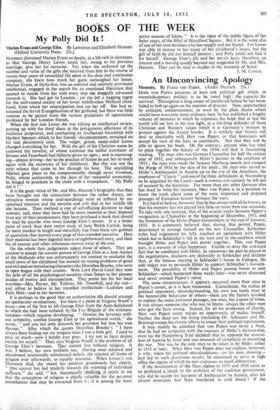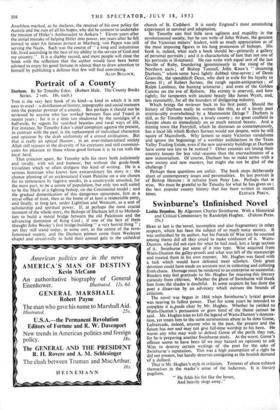An Unconvincing Apology
Memoirs. By Franz von Papen. (Andre Deutsch. 25s.) HERR VON PAPEN possesses at least one political gift which, in twentieth-century politics, is to be rated high : the capacity for survival. Throughout a long career of unrelieved failure he has never failed to bob up again on the morrow of disaster. Now, unperturbed by criticism, embarrassment, or even by the plain shame which would have overcome more ordinary men, he has published a lengthy volume of memoirs in which he expresses the hope that at last the world will see him in his true light, as a life-long defender of those Christian and Western values which it is Germany's mission to protect against the Asiatic hordes. It is unlikely that history will deal so charitably with Herr von Papen, or that historians will accept his view of the facts so uncritically. Not that they will be able to ignore his book. On the contrary, anyone who has tried to piece together the history of the 1930s will find it fascinating reading. The man who was German Chancellor for half the critical year of 1932, and subsequently Hitler's partner in the coalition of 1933; the man who made the famous Marburg speech and escaped the Purge of 1934 by the skin of his teeth ; the man who served as Hitler's Ambassador in Austria up to the eve of the Anschluss, the employer of "Cicero "and one of the three defendants at Nuremberg to be acquitted by the Court—such a witness can scarcely be left out of account by the historian. Far more than any other German who has lived to write his memoirs, Herr von Papen is in a position to know the truth about some of the most important and disputed passages of European history between the wars. It is hard to believe, however, that he has always told all he knows, or that his memory has not played him false on more than one occasion. To take only one instance, that of the crucial weeks between Papen's resignation as Chancellor at the beginning of December, 1932, and the formation of the Hitler-Papen Government at the end of January, 1933. It is commonly believed that, during that period, Papen, determined to revenge himself on the new Chancellor, Schleicher (who had engineered his fall), reached an agreement with Hitler which led to Schleicher's fall in his turn and to the coalition which brought Hitler and Papen into power together. This, von Papen says, is a travesty of what happened. Unable to deny, the awkward fact that he combined with Hitler, he minimises the part he played in the negotiations, disclaims any disloyalty to Schleicher and declares that, at the famous meeting in Schroeder's house in Cologne, his sole object was to persuade Hitler to support Schleicher's Govern- ment. The possibility of Hitler and Papen joining forces to oust Schleicher—which happened three weeks later—was never discussed and never crossed Papen's mind.
The same circumstances, it appears, occurred more than once in Papen's career, as it is here recounted. Coincidence, the malice of political opponents, misunderstanding, his own too ready trust in the honourable behaviour of others—these are the factors invoked to explain the more awkward passages, not once, but a score of times. It was always someone else who was to blame, always the other man who got the facts wrong. Indeed, for all his profession of charity, Herr von Papen rarely misses an opportunity of malice himself. Neither the dead nor the living (including Dr. Adenauer and Dr. Briining) escape his clumsy efforts to smear their political reputations. It may readily be admitted that von Papen was never a Nazi, that he had no sympathy with the excesses of Hitler's dictatorship, even (as the Nuremberg Trial decided) that he opposed the annexa- tion of Austria by force and was innocent of complicity in launching the war. Nor was he the only man to be taken in by Hitler, either in 1933 or later. What Herr von Papen does not explain, however; is why, when his political miscalculations—on his own showing— had led to such disastrous results, he continued to serve in high office the regime of which he new expresses so much abhorrence.
If the development of the Nazi regime in 1933 and 1934 came as so profound a shock to the architect of the coalition government, why did he accept the key-post of Ambassador to Austria, after his closest associates had been murdered in cold blood ? If the
Anschluss marked, as he declares, the reversal of his own policy for Austria and the ruin of all his hopes, why did he consent to undertake the mission of Hitler's Ambassador to Ankara ? Eleven years after the initial mistake of helping Hitler into power, ten years after he felt moved to utter his famous protest at Marburg, von Papen was still serving the Nazis. Such was the course of" a long and industrious life, lived according to the best of my ability in the service of God and my country." It is a shabby record, and most people will close the book with the reflection that the author would have been better advised to enjoy his good fortune in silence than to draw attention to himself by publishing a defence that few will find convincing.
ALAN BULLOCK.



































 Previous page
Previous page